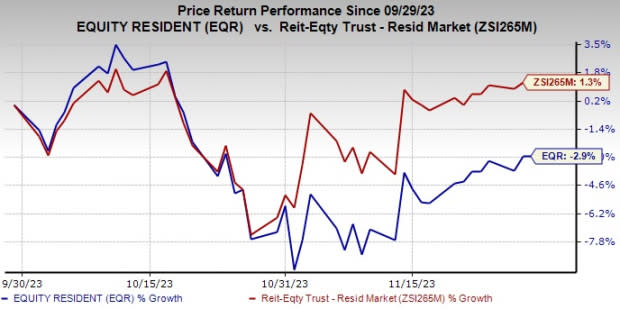Is it Wise to Retain Equity Residential (EQR) Stock for Now?
Equity Residential EQR has a dominating presence in Boston, New York, Washington, DC, Seattle, San Francisco and Southern California. The healthy demand for residential rental units positions the company well for growth. Also, its portfolio diversification efforts and technological initiatives augur well. However, the supply of rental units in some markets and high interest rates make us apprehensive.
What’s Aiding it?
Equity Residential operates in markets with an affluent tenant base and continues to benefit from the healthy demand for residential rental units in these markets. Moreover, with prevailing high interest rates and limited single-family home inventory, the cost of home ownership has risen relative to rents. This has made the transition from renter to homeowner difficult, making renting apartment units a more affordable and flexible option.
The residential real estate investment trust (REIT) is making concerted efforts to diversify its portfolio and expand its footprint in the suburban markets, wherein these affluent renters prefer to live, work and play. EQR’s efforts to capture the renter demand in these markets are likely to pay off well in the upcoming period. For 2023, we estimate a year-over-year growth of 5% in the company’s total rental income.
The company is leveraging technology and organizational capabilities to drive rent growth and improve the efficiency of its operating platform. It is focusing on equipping its properties with tech-driven features like smart home technology and building-wide Wi-Fi implementation to enhance customer experience.
Such efforts are likely to also bring about operational resiliency by reducing costs. This gives Equity Residential a competitive edge over others and will aid in driving net operating income (NOI) growth in the upcoming period. Our estimate for current-year NOI indicates a year-over-year increase of 4.9%.
Equity Residential is focusing on enhancing its portfolio quality by disposing of older properties and acquiring newer properties in submarkets with high numbers of affluent renters and favorable long-term demand drivers and manageable forward supply.
During the nine months ended Sep 30, 2023, Equity Residential acquired four operating properties for an aggregate purchase price of $366.3 million and disposed of eight for an aggregate sale price of $195.4 million. Such efforts highlight its prudent capital management practices and preserve balance sheet strength.
Equity Residential’s encouraging development pipeline amid healthy demand for rental apartment units bodes well. As of Sep 30, 2023, the company had seven projects (consolidated and unconsolidated) under development, comprising 2,207 apartment units.
On the balance sheet front, the company had $2 billion of liquidity and a net debt to normalized EBITDAre of 4.24X as of Sep 30, 2023. Also, unencumbered net operating income (NOI) as a percentage of the total NOI was 89.8% in the third quarter, up from 88.5% reported in the prior quarter. An A-rated balance sheet renders the company access to the debt market at favorable rates.
Hence, with manageable debt maturities, a large pool of high-quality unencumbered assets and solid credit metrics, EQR seems well-positioned to capitalize on growth opportunities.
What’s Hurting it?
The residential real estate market is witnessing an influx of new deliveries as the construction of several projects that had been put on hold during the pandemic is nearing an end. As a result of the elevated supply in some of the markets where the company operates, its ability to increase rent is likely to be affected. This phenomenon is expected to lead to rent growth moderation to a certain extent in the upcoming period.
The continuation of the remote working environment has resulted in lower renter demand for costlier and urban/infill markets, raising concerns for EQR’s properties that are concentrated in the urban markets. This is likely to hurt occupancy levels at these properties. For 2023, management expects physical occupancy to stand at 95.9%, down 10 basis points from the prior guidance of 96%.
Further, given the prevailing high interest rate environment, Equity Residential may find it difficult to purchase or develop real estate with borrowed funds as the costs are likely to be on the higher side.
Shares of this Zacks Rank #3 (Hold) company have lost 2.9% in the quarter-to-date period against the industry’s rise of 1.3%.

Image Source: Zacks Investment Research
Stocks to Consider
Some better-ranked stocks from the residential REIT sector are Invitation Home INVH, American Homes 4 Rent AMH and Centerspace CSR, each currently carrying a Zacks Rank #2 (Buy). You can see the complete list of today’s Zacks #1 Rank (Strong Buy) stocks here.
The Zacks Consensus Estimate for Invitation Home’s 2023 FFO per share is pegged at $1.79, suggesting year-over-year growth of 7.2%.
The Zacks Consensus Estimate for American Homes 4 Rent’s ongoing year’s FFO per share stands at $1.65, indicating growth of 7.1% from the year-ago quarter’s reported figure.
The Zacks Consensus Estimate for Centerspace’ current-year FFO per share is pegged at $4.66, implying 5.2% year-over-year growth.
Note: Anything related to earnings presented in this write-up represents funds from operations (FFO) — a widely used metric to gauge the performance of REITs.
Want the latest recommendations from Zacks Investment Research? Today, you can download 7 Best Stocks for the Next 30 Days. Click to get this free report
Equity Residential (EQR) : Free Stock Analysis Report
American Homes 4 Rent (AMH) : Free Stock Analysis Report
Invitation Home (INVH) : Free Stock Analysis Report
Centerspace (CSR) : Free Stock Analysis Report
